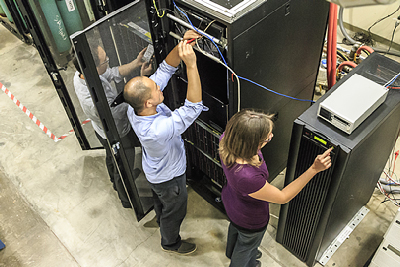APEP Collaborating with Microsoft on Fuel Cell Powered Data Centers Technologies
April 21, 2014

The Advanced Power and Energy Program is working with Microsoft Corporation to improve the reliability and the energy efficiency of datacenters. The research and development work also aims to reduce infrastructure costs and environmental impacts by initially demonstrating and evaluating the use of a 10 kW Proton Exchange Membrane Fuel Cell (PEMFC) stack and system for directly powering the servers in a data center. In this study, APEP is designing, testing and demonstrating a PEMFC system as a Distributed Generation (DG) prime mover that has high reliability and efficiency for both steady state and dynamic operation of the servers. The 10kW PEMFC stack and system was designed as the distributed power source within the server rack that can be used to eliminate the power distribution system that would otherwise be required for the datacenter. The steady state electrical and thermodynamic performance characteristics, such as efficiency and polarization curves, are being evaluated for various electrical configurations including a 208 VAC, 380 VDC, and 48VDC powering of the servers. The ramp rate and dynamic response time of the fuel cell system are also being characterized and used to develop optimal control strategies and system designs to enable dynamic load following capability.
Fuel cell technology is an attractive, emerging electrical power generation technology for data centers because it can directly convert fuel to electricity leading to high fuel-to-electric conversion efficiencies without pollutant emissions. A simple way of utilizing fuel cells as data center power sources is to connect them as grid replacements or backup generators.
